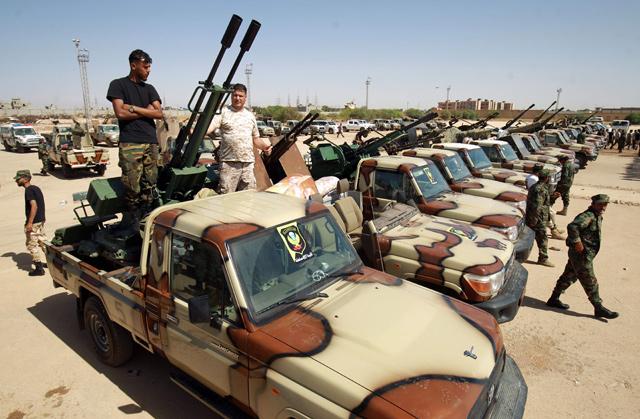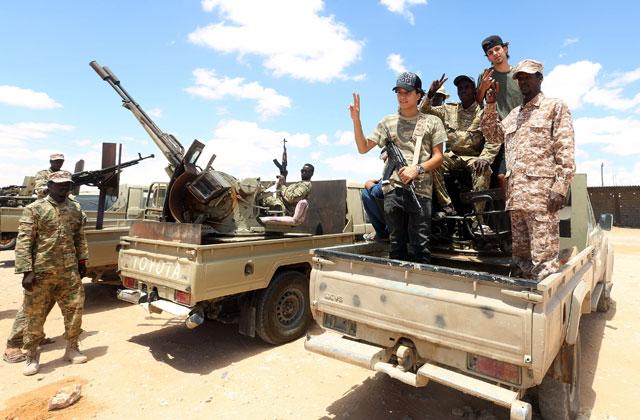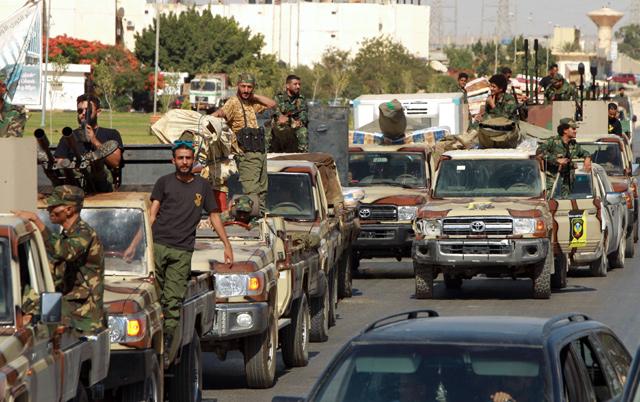You are here
Tripoli gov't to boycott Arab League Libya talks
By AFP - Jun 20,2020 - Last updated at Jun 20,2020

Members of the self-proclaimed eastern Libyan National Army (LNA) special forces gather in the city of Benghazi, on their way to reportedly back up fellow LNA fighters on the frontline west of the city of Sirte, facing forces loyal to the UN-recognised Government of National Accord, on Thursday (AFP photo)
TRIPOLI — Libya's UN-recognised unity government has said it will boycott talks on the conflict in the North African country to be held by Arab League foreign ministers next week.
Foreign Minister Mohamad Taher Siala told the bloc's executive council on Friday that the planned meeting would "merely deepen the rift" between Arab governments on the conflict, his ministry said.
The talks, to be held by videoconference because of coronavirus concerns, were called for by Egypt, a key supporter of the Tripoli government's archfoe, eastern-based strongman Khalifa Haftar.
Siala complained there had been no prior consultation with his government, even though the meeting concerned Libya, and said the virtual format of the meeting was not appropriate for addressing the thorny issues involved.
The head of Tripoli's Government of National Accord, Fayez Al Sarraj, visited Algeria on Saturday and had talks with President Abdelmadjid Tebboune, the official Algerian Press Service said.
Algeria, which is seeking to mediate a peaceful solution to the Libya war, shares a 1,000-kilometre border with Libya and has repeatedly denounced foreign interference in its eastern neighbour.
Turkey, which backs the GNA, said Saturday that Haftar’s forces must withdraw from the strategic city of Sirte for a lasting ceasefire and accused France of “jeopardising” NATO security.
Ibrahim Kalin, Turkey’s presidential spokesman, told AFP that Sirte and Al Jufra both needed to be evacuated by Haftar’s forces, as demanded by the GNA, for a “sustainable ceasefire”.
“It should be a sustainable ceasefire, meaning that the other side, the LNA (Libyan National Army), should not be in a position to launch another attack on the legitimate Libyan government any time it wants,” Kalin told AFP in an interview in Istanbul.
Kalin said a ceasefire in Libya would be possible if everybody went back to their positions in 2015, referring to a political agreement reached that year in Morocco. That would mean Haftar withdrawing from Sirte and Al Jufra.
“This is the position of the GNA and we support it because right now the Haftar forces are using these strategic locations as their launching pad,” he said.
Kalin also accused France of “jeopardising” NATO’s security by supporting Haftar.
“In Libya we are supporting the legitimate government and the French government is supporting an illegitimate warlord and jeopardising NATO security, Mediterranean security, North African security and Libya’s political stability,” Kalin said.
“Given all this they still blame us, they still criticise us... We are working with the legitimate actors here. It is France that is intervening in all of those areas, working with the wrong actors, supporting illegitimate players and then turning and accusing us.”
Turkey sees no role for Haftar in Libya’s future.
“He has been unreliable from the very beginning. He has spoiled every single ceasefire agreement, every attempt at de-escalation and the GNA will not support any talks that will involve Haftar. This is what we are gathering from their analysis and we support that,” Kalin said.
On Egypt, Kalin said Ankara understands Cairo’s “legitimate” security concerns over the Egyptian-Libyan border but supporting Haftar is a “wrong policy”.
“They should support the GNA, they should support a Libyan-led political process.”
Asked about Turkey’s future in Libya, Kalin said: “We will be there as long as we are requested by the Libyan government to be there.”
GNA forces are now in the ascendancy after defeating Haftar’s forces, driving them out of western Libya earlier this month. It aims to seize Sirte and Al-Jufra.
Egypt responded with a peace initiative was widely viewed as a bid to buy time for Haftar’s force to regroup.
The GNA and Turkey both dismissed the initiative and called for continued ceasefire negotiations under the aegis of the United Nations.
Washington too called for UN-led ceasefire talks.
Oil-rich Libya has been torn by violence, drawing in tribal militias, extremists and mercenaries since the 2011 toppling and killing of longtime dictator Muammar Qadhafi in a Western-backed uprising.
The latest escalation has been marked by an uptick in foreign involvement.
Recent weeks have seen tensions rise between Turkey and France, which despite public denials has long been suspected of favouring Haftar until his recent setbacks.
The United Nations has urged outside powers to respect a deal reached at a January conference in Berlin, calling for an end to foreign meddling and upholding a much-violated arms embargo.
Related Articles
BENGHAZI, Libya — A spokesman for eastern Libyan strongman Khalifa Haftar has slammed a ceasefire announcement by the rival Government of Na
UNITED NATIONS, United States — Rival forces in Libya have failed to begin withdrawing as required under an October ceasefire agreement aime
CAIRO — Egypt's president warned on Saturday that advances by Turkey-backed Libyan forces on the Libyan city of Sirte could prompt an Egypti

















